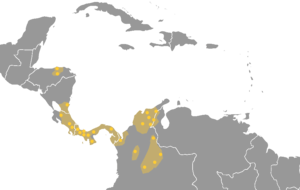Duit language
| Duit | |
|---|---|
| Native to | Boyacá, Colombia |
| Region | Altiplano Cundiboyacense |
| Ethnicity | Muisca |
| Extinct | yes |
|
Chibcha
| |
| Only numerals | |
| Official status | |
Official language in | Muisca Confederation |
| Language codes | |
| ISO 639-3 |
None (mis) |
Linguist list |
qrx (also used for the unrelated Mittlere Neu-Hebriden) |
| Glottolog |
duit1239[1] |
|
The second-most southern yellow dot indicates roughly the area where Duit was spoken | |
Duit is an extinct Chibcha language, spoken by the Muisca of present-day Boyacá, Colombia. The language appears in the modern name of the pre-Columbian settlement and last ruler Tundama; Duitama.[2]
Description
The language is only known from one fragment analysed by scholar Ezequiel Uricoechea in 1871. The linguist mentioned that the analysed text was part of a larger work that hitherto not has been found. From the short text it was clear that the Duit language differed slightly from the main version of Chibcha, Muysccubun, spoken by the Muisca on the Altiplano Cundiboyacense.[3]
As the Muisca did not have a script, only for their numerals, written Duit language texts do not exist.[4]
Comparison to Muysccubun and numerals
| English | Duit | Muysccubun | Numerals as noted by Acosta, Humboldt and Zerda |
|---|---|---|---|
| one | atia | ata |  |
| two | bocha | bosa | |
| three | meia | mica | |
| Sun | sa | súa | |
| Moon | tia | chía | |
| star | cúrcha | fagua[5] | |
| Earth | coga | quica |
See also
References
- ↑ Hammarström, Harald; Forkel, Robert; Haspelmath, Martin; Bank, Sebastian, eds. (2016). "Duit". Glottolog 2.7. Jena: Max Planck Institute for the Science of Human History.
- ↑ (Spanish) Biography Cacique Tundama - Pueblos Originarios
- ↑ Uricoechea, Ezequiel. 1871. Gramática, vocabulario, catecismo y confesionario de la lengua chibcha, según antiguos manuscritos anónimos e inéditos.
- ↑ Izquierdo Peña, 2009
- ↑ (Spanish) fagua - Muysccubun online dictionary
Bibliography
- Izquierdo Peña, Manuel Arturo. 2009. The Muisca Calendar: An approximation to the timekeeping system of the ancient native people of the northeastern Andes of Colombia (PhD), 1-170. Université de Montréal. Accessed 2016-07-08.
This article is issued from Wikipedia - version of the 12/4/2016. The text is available under the Creative Commons Attribution/Share Alike but additional terms may apply for the media files.
